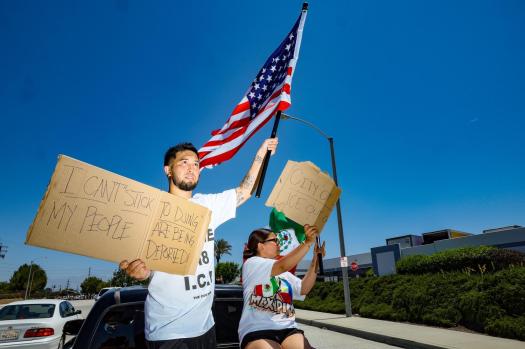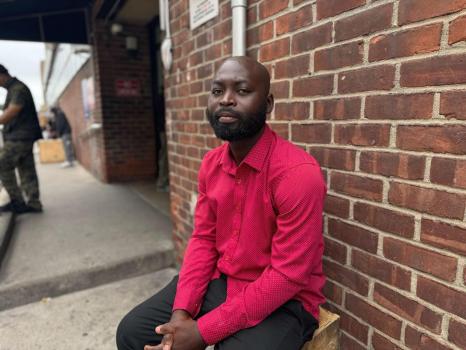From the Los Angeles Times, by Brittny Mejia
Los Angeles Throughout her life, Jackie Ramirez has been conscious of her skin tone.
Related Articles
-
Supreme Court doesn t rule on Louisiana s second majority Black congressional district
-
RFK Jr. s made promises about vaccines. Here s what he s done as health secretary
-
Supreme Court upholds Texas law aimed at blocking kids from seeing pornography online
-
Supreme Court says Maryland parents can pull their kids from public school lessons using LGBTQ books
-
Supreme Court preserves key part of Obamacare coverage requirements
She was known as Morenita, the tiny brown girl, by the school crossing guard. The uncle lovingly referred to her as a rural girl, or paisita.
But this month, with immigration officers swarming Southern California and making hundreds of arrests, skin color has never been more important. Stories and videos of people being arrested at car washes have gone viral. Without a warrant, agents are removing street sellers. A Latino American citizen was questioned about the hospital where he was born.
It is often established that those who drive while Black have increased anxiety. However, the recent immigration sweeps have shown the significant impact that skin tone and other associated circumstances have on Latinos.
East Los Angeles is where Ramirez was born and reared. Her father is Mexican, while her mother was born in Mexico.
Ramirez, who hosts The Cruz Show on Real 92.3 in Los Angeles, stated, “You’re afraid to be brown.” Right now, you’re afraid to look a certain way.
The alleged racial profiling of agents has been refuted by the Department of Homeland Security. Claims that people are being singled out due to their skin tone are repugnant and completely untrue, according to agency spokesman Tricia McLaughlin. However, this hasn’t allayed worries that individuals with darker skin tones will be more likely to be stopped by immigration police.
Children of Latino parents in the United States are being cautioned by their parents to exercise caution when they leave the house. Passports are now often carried in the pockets of some people. Employees at a Santa Ana coffee shop advise patrons to take care of themselves and encourage their loved ones to text them when they arrive home.
Even Latinos with lighter skin tones have voiced concerns. Recently, 24-year-old Franchesca Olivas traveled two hours from Hemet, Riverside County, to attend a demonstration in downtown Los Angeles. She claimed that because I am half-white and her dad is pure Mexican, she drives him about because he is afraid of being stopped.
A lawyer from the Los Angeles South Bay area named Taylor Tieman said on Instagram Threads, “I’m a white-passing, third-generation Latina, and I’m scared.” I sincerely apologize to my siblings. You are being let down by this nation.
Nico Blitz, Ramirez’s Filipino American fiancé, emphasized the raids’ effects on people of all races and ethnicities in a different post that has now received over 8,000 likes.
Filipinos, especially in the eyes of ICE, your legal status does not imply that you are not brown. The Cruz Show’s DJ host, Blitz, made a post. Black folks and Latinos are not alone in this struggle.
According to studies, skin tone has always had an impact on Latinos’ and other Americans’ lives. Less money, a poorer socioeconomic standing, and more health issues are some of the drawbacks associated with darker skin.
Sixty-two percent of Latino Americans asked by the Pew Research Center in 2021 stated that they believed having darker skin hampered their chances of success. Additionally, 57% of respondents stated that their skin tone greatly or somewhat influences their experiences in daily life, and roughly half of them stated that racial or skin-color discrimination is a major issue in the United States.
However, skin color has created an additional element of terror in the context of President Donald Trump’s immigration crackdown.
Tribal people were allegedly being harassed by Immigration and Customs Enforcement authorities in January, according to Native Americans.Nine congressional Democrats wrote to Trump expressing their concern over a number of alarming allegations about the harassment and incarceration.
Members of Native American tribes are citizens of the United States. According to the letter, it is never appropriate to stop someone because of their appearance, including dark skin, Asian, Latino, or Native American features. It is unconstitutional and un-American for ICE to engage in the deadly practice of harassing Americans based only on their appearance.
According to a U.S. Marshals Service spokesperson, ICE officers in Tucson, Arizona, wrongly detained a deputy U.S. marshal this year because he matched the broad description of a subject that ICE was looking for. The agency did not specify which description the deputy U.S. marshal suited.
According to the statement, the deputy U.S. marshal left the premises without incident when other law enforcement officials verified his identity.
In early June, as immigration officers accelerated arrests throughout Southern California, L.A. County Supervisor Hilda Solis issued a statement alerting constituents to the fact that individuals were being singled out due to their skin color and occupation.
Solis, whose father is from Mexico and her mother is from Nicaragua, claimed she has never felt more under threat.
In an interview, Solis stated that it is an attack on people of color as well as our immigrant population. I am aware that many people—including those with whom I am acquainted, friends, and coworkers—have mixed-status families, and that many of them are afraid to even go to work or drop their children off at school. And our economy is suffering as a result.
Asians were being targeted because of their appearance at the height of the COVID outbreak, according to Solis.
“It’s Latinos now,” she stated.
While strolling with his sons on a recent weekday, Martin Chairez, a minister at a Santa Ana church, paused to snap pictures of the National Guard soldiers stationed outside Orange County’s Ronald Reagan Federal Building and Courthouse. There, he had brought his sons to offer his prayers for the neighborhood.
Chairez arrived in the United States at the age of nine after being born in the Mexican state of Nayarit. Among the millions of immigrants brought to our country before the age of sixteen, he was a so-called Dreamer. Additionally, he benefited from the Deferred Action for Childhood Arrivals program, which let these undocumented youths to lawfully work, travel, and pursue higher education.
Despite being married for 20 years, Chairez said that his wife was unable to apply for his legal status until their eleventh wedding anniversary. He is now a permanent resident of the country.
Chairez said he witnessed refugees and asylum seekers from Haiti, Ukraine, South America, and Central America while he was a director at a border program in Tijuana.
The fact that no one from Russia or Ukraine is being arrested or deported when they shouldn’t be is quite telling. With his hands on his hips, Chairez remarked, “They also came here seeking opportunity and escaping war.”
He remarked, “I think it’s revealing that people from Europe are not being targeted, but people from Central and South America are.” And once more, not only should they not be, but so should the citizens of South and Central America.
Chairez’s wife is Black, and his boys, ages 12 and 14, are mixed-race. “I’ll have to have those conversations with them about what it means to drive while being a Black man when they get older and learn to drive,” he said.
That now applies to practically every part of our life, not simply those circumstances, he remarked. Will we be singled out when we go shopping, to the grocery store, or even just to go on a walk? We appear to be in a constant state of vulnerability, which is not acceptable. That isn’t fair.
Chelsea Salazar, 23, was nearby and hurried back to her Santa Ana parking meter after taking pictures of the National Guard. Salazar, an immigrant daughter who lives in Corona, claimed to have heard about a raid on the 91 Freeway, which she used to go home from her work as a behavioral interventionist.
It dawned on her then that she had left her passport and identification at home. In a panic, Salazar, who suffers from anxiety, begged a friend to wait at her house while things subsided rather than heading for the freeway. Despite being a citizen, she claimed to have wondered if they would believe her. And what will they do to me?
According to her, I did feel as though I would likely be picked out or treated differently.
According to 24-year-old U.S. citizen Carlos Garcia Mateo, his parents are legally recognized and only recently received their documents after 20 years. The Santa Ana resident mentioned his own concerns and drew attention to the length of time it takes to obtain U.S. citizenship in the nation.
Will I be subjected to racial profiling if I leave my house? He inquired. People frequently make references to Nazi Germany, and it is somewhat true. Take notes first, then inquire afterward. What is the precedent for that?
Over fifty individuals participated in a march against raids and deportations on Father’s Day at Avocado Heights Park in the San Gabriel Valley. A handmade sign in Spanish advertised goat milk for sale at a residence close to the park. Behind a wooden fence, the animals bleated.
Despite the relentless sun, members of the equestrian community assembled on horseback, in cars, and on foot to make the more than three-mile journey to City Hall, with an American flag wrapped over one rider’s shoulders. People held posters that said, “I drink my horchata warm because I hate ice, and La Puente heat melts ice.”
Along the way, someone wheeled a speaker, and music emanated from cars in the procession. Somos M’s Americanos by Los Tigres del Norte was on their soundtrack. We are more American. Return to my land, the band sang, after being yelled at a thousand times.
The lines boomed out, and I want to remind the gringo: I didn’t cross the border; the border crossed me. Man divided America, which was free at birth.
Sitting in the bed of a black Toyota Tacoma pickup, Ramirez and Blitz joined the convoy. Inside were Ramirez’s brother, sister-in-law, and niece, who is four years old. Blitz hoisted an American flag, while Ramirez waved a Mexican one.
I want the Filipino community to understand that we are also brown. Blitz, who was born in San Francisco, stated that no matter what we do, we will not be white and our skin will not be white.
We may be able to legalize ourselves. “Maybe our parents are legal,” he remarked. However, I believe that ICE agents are not searching for the paperwork when they are out. They don’t appear to be asking, “Hey, where’s your passport?” They are examining your skin tone.
Ramirez and Blitz took seats on the grass at La Puente City Hall. In addition to calling out the groups of people who had been detained by immigration officials, organizers encouraged attendees to register to vote if they were eligible. fruit sellers. Workers at car washes. workers in construction.
“My elote man!” exclaimed a young woman.
The Avocado Heights Vaquer@s’ Samuel Brown-Vazquez informed the audience, “These are important members of our community.” The folks who come to work are the ones the agents are pursuing, not the criminals.
Someone nearby was holding a placard that said, “Sin miedo y con orgullo.”
With pride and without fear.
The audience started yelling, “S se puede,” and Ramirez joined in.We can, indeed.
(This report was written by Summer Lin, a staff writer for the Los Angeles Times.)
Los Angeles Times, 2025. Go to latimes.com. Tribune Content Agency, LLC is the distributor.












